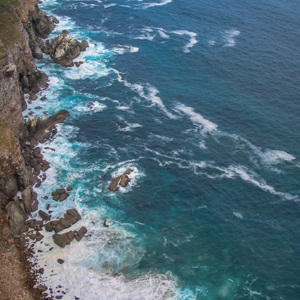
US Secretary of State John Kerry warned royalty, corporate kings and environmental warriors that governments won't save the seas without "significant impetus" from every sphere of society.
Rapacious global appetite
Kerry's comments came via video link to a large gathering at scenic Half Moon Bay, California that has brought together countries big and small to find ways to prevent oceans from being destroyed by a rapacious global appetite for food and resources.
"We don't yet have the political consensus or the urgency translated into political action," Kerry said during a video chat that kicked off the World Ocean Summit, organised by The Economist.
"And we know that there's no way that governments are going to tackle this enormous challenge, frankly, without significant impetus from the private sector, the NGO community, academia, media and others."
Read: Beware: ocean stingers can kill
A note struck time and again at the meeting was the need to translate the destruction of seas and marine life into economic values that everyone, from world leaders to fishermen, can take to heart.
"Every human on Earth depends on the oceans for the food we eat and the air we breathe," Kerry said.
"The environmental reasons for protecting the planet's oceans should be leaping out at people."
Monaco's Prince Albert II, who took part in a panel discussion, said that "preservation of the environment cannot be accomplished against human wishes.
"It can only work with a sustainable model recognizing the goals of humanity and the requirements of nature."
Dead zones
Those attending the summit are well versed in disastrous threats facing the seas, from overfishing to dead zones where pollution makes any form of life impossible.
However, a casual poll showed participants were broadly optimistic that these problems could be beaten.
"The facts are still extremely worrying," cautioned United Nations under-secretary general Achim Steiner, head of the UN environment program.
"At the same time, we are seeing an enormous groundswell in activity to try to address this phenomenon."
Overarching themes included sustainability when it comes to fisheries and other gifts from the sea, and the inescapable need for nations to work together.
Threats include illegal fishing practices smashing food chains and wiping out species; pollution, including fertilizer, run-off from inland farms, and climate change.
Read: Arctic Ocean may be methane source
Regulations difficult to enforce
Some here questioned why technology innovators from nearby Silicon Valley weren't featured at the summit, especially when speakers balked at backing regulations regarding fishing on the high sea on the grounds they are too difficult to enforce.
"It really is a missed opportunity," said Liquid Robotics chief executive Bill Vass, whose company makes drones that patrol the ocean.
"It almost seems as though it is about not wanting enforcement rather than being unable."
Drones assembled by Liquid Robotics at its headquarters in the Silicon Valley city of Sunnyvale can operate autonomously for a year, generating energy from waves and sun.
Drones can taste the water
Drones use sonar to identify sea creatures and vessels, and even "taste" the water for chemical analysis.
Data is sent back using the lowest power, cheapest method feasible ranging from satellite to Wi-Fi of mobile phone network if near a coast.
"These little critters can stay out all year long and we do it without polluting the ocean," Vass told AFP.
Unlike low-altitude drones, aquatic drones aren't grounded by weather and can peer deep below the water.
Liquid Robotics drones are already used by defence agencies as well as oil and gas companies.
Finding ways to monitor overfishing and other abuses of the seas presents the type of "hard engineering problems" that Silicon Valley likes to take on, Vass said.
Read: Source of mercury in ocean fish discovered
Doing a lot with technology
The battle to save the seas could use allies in technology, from internet titans with huge cash reserves and lofty mission statements right down to the makers of applications for smartphones or tablets.
"It would be nice to have some of those young entrepreneurs doing a lot with technology come up and talk about what can be deployed," one attendee maintained.
"If people out on the high seas thought there were eyes on them, they might not take risks."
Read more:
Ocean warming threatening seaweeds
Can farmed fish save the oceans?
Ozone thinning has changed ocean circulation




 Publications
Publications
 Partners
Partners














